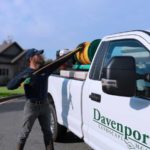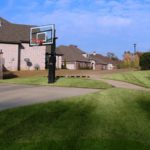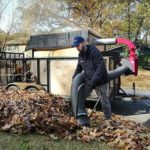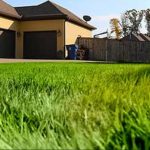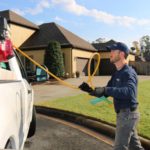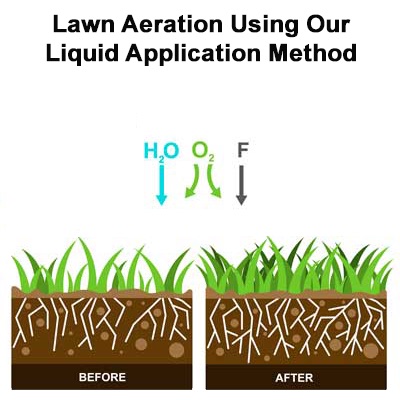 Have you noticed that you have to water your lawn significantly more than you should in order to prevent it from drying out? It could be an indication that your soil is compacted. Of the many factors that negatively impact a lawn’s health and appearance, soil compaction is quite possibly the most common. Hard, packed soil is simply not conducive to plant growth. In compacted ground, roots struggle to grow because the amount of water, air and space necessary for them to survive is confined to a thin layer of soil on the surface that is often less than an inch thick. This means that compacted lawns will have to be watered longer and more frequently than lawns that aren’t compacted. Grass in areas that are heavily compacted will be shorter than surrounding areas because the root system simply won’t be able to keep up. In severe instances, grass will begin to thin out and die.
Have you noticed that you have to water your lawn significantly more than you should in order to prevent it from drying out? It could be an indication that your soil is compacted. Of the many factors that negatively impact a lawn’s health and appearance, soil compaction is quite possibly the most common. Hard, packed soil is simply not conducive to plant growth. In compacted ground, roots struggle to grow because the amount of water, air and space necessary for them to survive is confined to a thin layer of soil on the surface that is often less than an inch thick. This means that compacted lawns will have to be watered longer and more frequently than lawns that aren’t compacted. Grass in areas that are heavily compacted will be shorter than surrounding areas because the root system simply won’t be able to keep up. In severe instances, grass will begin to thin out and die.
So what causes soil compaction anyway? There are many things actually, but a couple of obvious ones are traffic, such as lawn mowers and playing kids, and poor drainage. Now you shouldn’t prevent your kids from playing on the lawn, and you have to mow, so there isn’t much to do about that. Drainage issues can be costly and difficult to fix, and should be resolved when possible, but even correcting these things will only get you so far. That is because the biggest factor contributing to soil compaction is the lack of a healthy biological component. Healthy soil is teeming with life, ranging from microscopic bacteria and fungi, to large natural aerators such as earthworms. Unfortunately, when new homes are built, there is rarely any effort made to renew the biological component that is destroyed during the construction process. In addition, most lawn care companies don’t include soil amendments in their maintenance regimen that purposefully nurture and build this all important biological component. As a result, we are left with soil that is void of diverse life, and that sheds irrigation water rather than receiving it.
As you can see, compaction is an issue that should be addressed if you are interested in building a healthy, attractive lawn, but how does one do that? One method that is often used to attempt to reduce compaction is mechanical core aeration. This is the process of using a machine to remove pieces of soil, or cores, that are roughly shaped like an apple core. The idea is that the void will allow water to penetrate deeper, and thereby make more of the soil inhabitable for grass roots. The problem with this method is that it only impacts a small percentage of the total lawn area, and it doesn’t address the likely underlying issue of the soils biological health, so the problem persists.
Our approach to relieving compaction is simple. The first rule is do no harm. That means we carefully consider the impact of the products we use on the overall health of the soil. Many of the lawn care products on the market today can have a negative impact on soil biology, so it’s a case of knowing what to use, and how to apply it. Secondly, we understand that a well rounded lawn care regimen has to provide a food source for the soil biology. Soil biology relies on the carbon that makes up organic material to sustain itself. For this reason, most all of the lawn applications we make will include an organic component. This approach alone, when coupled with proper mowing and watering, will improve soil and reduce compaction over time. However if your lawn is severely compacted and in need of immediate improvement, or you just want to do everything you can to make your lawn look its best, then you may want to consider our liquid aeration service. We use a combination of humic substances, plant food sources, microbial food sources and soil penetrants to activate and feed soil biology deep beneath the surface. Our application will create voids in the soil for new roots to colonize, which will have an immediate impact on the health of the soil and the lawn. Unlike mechanical core aeration, our method will positively impact virtually all of the soil in your lawn without leaving cores of dirt on the surface. Additionally, with our liquid aeration there is no need to locate valve boxes, irrigation heads, underground phone lines and utilities to prevent the damage that a mechanical aerator is known to cause.
Use our online quote form or give us a call today if you would like more information or to schedule your liquid aeration. We look forward to helping you with all of your lawn care needs. Be sure to review our latest Specials & Offers.

